- Home
- Dana Cameron
Site Unseen Page 5
Site Unseen Read online
Page 5
But I can’t just stand here and let him shoot me…
I had absolutely no idea what to do. So the stranger made my decision for me.
Chapter 3
THE SOUND OF SLAMMING TRUCK DOORS CAUSED US both to look up the slope. The rest of the students had arrived. I saw that Alan and Pauline were staring in shock down at me and the stranger. Panic welled up in me as he spoke again.
“All right, sweetie, I haven’t got time for this shit.” Straightening his arm, improving the already point-blank range, he then suddenly lowered the pistol, turned on his heel, and headed for the crumbly cement stairs leading to the narrow shingle. He pivoted, still brandishing the gun, still carrying the damned metal detector. “I haven’t got time for this now. I’ve got important business. But if I ever see you again, it’s all over.” Then he simply stalked down the stairs and out of sight.
I was frozen in place, expecting him to rush back if I moved. Eventually anger and prudence took control again, and I forced myself to walk over to the crumbly staircase that led from the bluff to the beach. The stranger was nowhere in sight. He moves fast, there’s no trace…wait a minute, just below the cobbles at the high-water line. I saw footprints heading east round the bend, toward the public beach and the parking lot a mile away. I needed to call the sheriff’s department before he got too far. As I picked my way back up to the trenches, I found myself starting to tremble even more violently, sweat coursing down the inside of my shirt, and the hair on the back of my neck stood on end. That didn’t just happen, I kept telling myself. People don’t act like that—
I turned and saw Meg flying down the hill toward me, and the adrenaline rush that had been supporting me suddenly fled my system. My hands were like ice, and the prickling down my scalp and spine competed with the roiling in my stomach. I tried to call out to her and had to swallow several times before I could actually speak. The dry taste of dirty pennies wouldn’t go away. I started to shake violently again and couldn’t stop. Typical fight-or-flight reaction, I thought, cataloguing my symptoms as though they belonged to someone else. Quite an impressive thing to experience firsthand, I pointed out to the part of me that was screaming inside.
“Emma, oh my God, are you all right?” Meg was having no problems with her voice; she had grabbed my arm and was practically screaming in my ear. “I can’t believe it! He pulled an automatic on you!”
“Yeah, I know.” I began to giggle, I couldn’t help it. Automatic? That what that thing was? “Yeah, I saw the gun, Meg.”
I clamped down hard on the nervous laughter that threatened to well out of me; it scared me almost as badly as the stranger did. “I’m sorry, I’m a little shaky. Are you okay?”
Meg looked at me, amazed. “I’m fine. I just can’t believe it. I mean, that doesn’t happen out here, does it? I mean, you can hear about people pulling that sort of crap back home in Colorado, but out East…that just doesn’t happen here, does it? You were so calm about it all—”
She must be in a state of shock; I didn’t think she was a fool. “We need to call the sheriff’s department right away. Were you able to hear any of what happened?” I wondered if my legs would carry me up to the house.
“No, no, the wind carried off most of it,” Meg said apologetically. She continued on in something that sounded to me dangerously like awe. “It was amazing, the way you stared him down. You just faced him out.”
I didn’t do anything so useful, I thought, disgusted with myself. Out loud I said, “The only thing going through my mind was how to keep from getting killed. Getting us killed. I certainly wasn’t going to do anything to make him want to pull the trigger.” My teeth began to chatter now, but Meg didn’t seem to notice.
“I know, but I felt so helpless,” she repeated. “It was horrible. I didn’t have—”
I didn’t want her to dwell on these thoughts and she didn’t seem to be able to shut them off. I grabbed her hands, though I could barely feel them with my own numb ones. “I’m really glad that you stayed put,” I said emphatically, locking her gaze in my own. “There was nothing you could have done, and with someone as crazy as he is…any kind of distraction would have been…been bad.”
Meg started to protest, but I cut her off. “Look, I don’t know about you, but I’m freezing. Let’s get up to the house and phone the sheriff right now.”
“You’re sure you’re all right?” I asked Meg again, as we climbed up the slope.
“Yeah, fine. A little pumped is all.” Leave it to the young; Meg didn’t look as rattled as I felt.
We didn’t even have the few moments that it usually would have taken us to reach the house; everyone, including Pauline, had rushed down to meet us halfway. Alan looked a little sick, but even that didn’t keep him from piping up with the others.
“Emma, who was that?”
“Was that a gun he had—?”
“What was he doing there?”
As glad as I was to see everyone—I had to believe that their appearance saved my life—I couldn’t suppress a little feeling of annoyance at their questions and concern. I didn’t want to recount what had just happened to me; it was still too close and I still didn’t know what I made of it all myself.
I turned to Pauline. “Could you see him? Did you hear anything he said?”
“No, Emma, it was too far away. Are you okay?”
“I’m fine, I’m not hurt. I’ll be right back. I’m going to call the sheriff.”
I trotted up the steps of the porch and into the kitchen. The phone book was still opened to the municipal pages listing the number of the sheriff’s department, left from when I called yesterday. I was put through right away and related my version of the incident to the sheriff, the quiet-spoken bloke named Stannard, who’d been kind enough to me yesterday after I found Augie Brooks’s body. I felt stupid actually saying things like pistol and threat, but I had to accept that those were the words to describe what happened.
The sheriff recognized my description of the stranger. “Ah, me. It sounds like Grahame Tichnor.” He sounded weary. “Not the first time we’ve had problems with him, but this is unusual, even for him. I’ll come out and have a look around and then you should come down to the station and have a look at some photos, see if you can identify him.”
I irrationally thought of all the work I’d planned for today. “But I’m sort of busy right now—”
“Me too,” the sheriff said good-naturedly. “It will only take a minute.”
I sighed. “You’re right, I’m sorry. When can you get here?”
“About a half hour. I doubt our friend will be back any time soon, he’s just not the type. But just to be sure, I’ll have a car swing by the Point every so often, keep an eye out. And you tell Ms. Westlake to lock up good, come night. I’ll see you shortly.”
I hung up and watched as Pauline came in and began to clear up her breakfast things.
“What’d he say?” she asked.
“He’s coming out. He said to tell you to lock up at night and that they’d send someone around every once in a while, just as a precaution. You put your alarm on every night, right?”
Pauline looked back over her shoulder and shrugged. “I forget mostly. Who’d want my old things anyway?”
“Pauline, don’t be funny! Never mind your stuff, I’m worried about you! Promise me you’ll set your alarm and be careful!”
“I wish you wouldn’t make such an issue about the alarm,” Pauline said. “I’m not the one he was pointing that horrible thing at. I’m more concerned about you.” She took a towel down from the dish rack, and turned to face me as she dried her hands off, leaning against the island.
“Paul, an issue? You need to take care! All sorts of things are happening around here—yesterday a body on the beach, and now this guy—Tichnor, his name is—”
“Oh Lord. That poor excuse for a—”
“—he’s dangerous! He had a gun!”
Pauline waved my concerns aside. “Don’t fret so
, I managed to totter round the globe several times before you were born without coming to too much grief. I think I can just about manage locking the door at night. Grahame Tichnor has been a nuisance for more years than anyone cares to count; I’m not afraid of him and he’s not worth your worry. I’m not going to let some noisome little cretin boss me around my own place. And anyway, I’ve got people coming tonight, and I’ll be in Boston all next week, and the beginning of the next—so don’t worry about me. Honestly. I’m more worried about you. That must have been terrifying—”
“I’m fine,” I insisted. “I’m just a little…pumped, is all.” And I was fine, I told myself. Absolutely.
“If you’re sure.” Pauline folded the towel, gave me a peck on the cheek, and the matter was closed. The phone rang. “I’ll just take it in the other room, dear. And yes, for you, I’ll set the damned alarm.”
I went back toward the door, but something made me stop. Through the window I could hear Meg talking to the other students about the incident.
“—I just couldn’t believe it!”
“What did you do?” Alan asked. He’d been following Meg around the site ever since she’d arrived.
“Me? Nothing. There was nothing I could have done, without getting—”
“What did Emma do?” I heard Dian ask.
“She was the amazing one,” Meg said. “She just stared him out, didn’t back off or anything. The wilder he got, the calmer she got, just like a standoff. It was un-real.”
“No way!”
“I’m telling you, she’s got icewater for blood!”
Utter nonsense. It was at that point that I decided to go out there and explain exactly what happened and how there was nothing heroic in what I had done, or more precisely, not done, but when I reached for the door I realized that I was trembling violently again. I couldn’t feel my fingers, and the acid weight congealed in my stomach. Instead of going outside, I went into the little bathroom off the kitchen and ran hot water over my wrists until I was sure the trembling had stopped.
By the time I’d recovered my composure, answered the rest of the questions the students had, and got them settled into work, a new Jeep Cherokee with a “Fordham County Sheriff’s Department” logo arrived. I recognized the sheriff right away, average height, medium brown hair a little sun-bleached, and dark eyes. Nice-looking guy.
“Professor Fielding,” he said, offering me his hand. “This is starting to be a habit with us.”
“Hey, don’t look at me,” I protested, even though I knew it was probably a joke.
The sheriff’s face sobered. “You’re okay, though?”
“Yes. A little taken aback by it all.”
“Why don’t you show me where it happened and walk me through it?”
I led him past the working students to where Tichnor had kicked out the lines of that abandoned unit. The sheriff listened to my story, asking a question here and there for clarification, as he scanned the site, the working students, and the river. He walked over to the stairs and had a look at them and then the footprints that were still impressed into the sand. That was what reminded me.
“I don’t think I said anything to you about it when I called,” I began apprehensively, “but he, Tichnor I mean, said something about Augie Brooks. He said…said that I didn’t want to end up like Augie Brooks. Does that mean…do you think he had something to do with…the body?”
The sheriff shook his head. “I doubt it, he probably just meant dead, is all. The autopsy is scheduled for this afternoon, but it seems pretty clear so far that Augie had an accident. This time, it wasn’t one we could save him from. I think our friend Tichnor was adding a little color, is all.”
“But what about his threats?” I protested. “He’s crazy, certifiable! We can’t rely on him to behave rationally enough to want to stay out of trouble! There’s too much going on here, all of a sudden.”
The sheriff nodded. “We’ve been looking for him already and now we’ll book him for assault, just as soon as we find him. Like I said before, though, he’s probably going to do a fade for a while, now that he thinks he’s made his point. Just to be on the safe side, there’s safety in numbers, don’t forget.”
“Isn’t there anything else we can do?” Out of habit, I reached for my pen to chew on, a security blanket that was socially acceptable in academia, but caught myself and thought the better of it.
“Yes there is. If you and Ms., uh—” Stannard checked Meg’s name in his notebook. “Ms. Garrity up there could stop by the sheriff’s department later on and look at a few pictures, that would help. Also, if you would be so kind as to write up a couple of descriptions of what happened, it would be a big help.”
“I’ll do that,” I said, determined. “We’ll have them for you this evening.”
Stannard waved my proposed haste aside. “No hurry. You drop ’em by if you get the chance, or you can mail them in later if that’s more convenient.”
“You don’t seem really troubled by this,” I said, annoyed. “I mean, look at what’s been going on here—”
“I am troubled, I’m sorry it happened,” he broke in. “I’m doing what I can legally do about it all, but the reality of it is, summer brings out the nuts from wherever they hide during the winter. It’s what happens.” The sheriff saw that I wasn’t convinced and continued. “Look, I don’t want anything to happen to you, any more than you do, okay? We’ll do our best to find him and put everyone’s mind at rest.”
His eyes strayed back up toward the excavations, and he squinted, trying to concentrate. “So, tell me what’s going on here.”
“Well, we’re trying to identify whether this is the site of Fort Providence, which was built in 1605 as a stronghold, especially against the French—”
“If that’s the case, why isn’t the Point called Providence today?” the sheriff asked.
Good question, I thought. “Well, the seventeenth-century settlers had had a stormy passage, complete with a couple of sea battles, and were pretty pleased to make it over here alive—hence the name Providence. I suspect the Penitence name came long after, when the area was resettled for good and people tried to farm around here.”
We could both hear the ring of the students’ trowels on the stony soil, a good reminder of why fishing was a much more lucrative endeavor than farming in this area.
“Anyway, the fort predates Jamestown by a couple of years and Plymouth in Massachusetts by fifteen. If it had lasted more than a year, more people might know about it from the history books.”
Sheriff Stannard whistled, low and long. “So how do you know where to look?”
“That’s a matter of a bit of luck, in this case. There’s a lot of places along this river that it could have been, but the reason that I’m looking here is because artifacts of the right date were found here, and unless a collector dropped them or they were brought over as ship’s ballast, it’s real likely that this is where the settlement was.”
He ran his hand through his hair in thought, leaving some standing on end. “So what did it look like? You really don’t know what you’re going to find?”
“In archaeology you never know what you’ll find. Let’s put it this way: I’ve got data from forts built by the English about the same time as this one, in Virginia, Ireland, and the Caribbean. You read what other people have excavated on those sites, and maybe we’ll find the same thing here. And there was lots written at the time about how to set up a fort, picking out the right kind of land, looking for a defensible area, fresh water, and that sort of thing. So a lot of this work is based on educated guesses, but very well-informed educated guesses.”
He nodded slowly, observing the working crew. “And you dig down and find…what?”
“So far, we’ve got mostly sherds of pottery, a few animal bones, parts of clay smoking pipes, that sort of thing, but these are all late eighteenth-century artifacts. There wasn’t a whole lot going on down this end of the property before that, except for some f
arming.”
“Interesting,” he commented.
I nodded. “And what we do is dig down through the centuries, the most recent stuff, then older, and older as you go down. And we haven’t hit the seventeenth-century strata yet, but when we do, I’m betting we’ll find things, well, things that belonged to a fort, an outpost. You know, lead shot, trade items for the Native Americans, parts of weapons, in addition to the usual glass, pottery, and personal effects. Neat stuff.”
I thought about how archaeology is like visiting another country, where you may be well versed in the mores of the place, but where surprises still lurked around every corner. Historical culture shock with the lure of discovery.
“Sounds good,” the sheriff agreed, and we started to walk back up to where his Cherokee was parked. “My kids would love this. Could I bring them by, sometime? We wouldn’t get in the way or anything. I like to show my girls what all sorts of people do for work, you know?”
“Sure, any time.” We shook hands again, and as he left, I was surprised to find just how normal I felt again. Clever of the sheriff, I realized, to get me talking about my work. Settled me right down. Trying to capitalize on that feeling and trying to get some work done this morning, I went back down to check on the students.
I sensed a faint salt smell mingling with warm grass as I stopped by Alan’s unit first. As much as I knew he was trying hard, he just wasn’t cutting it. Unlike Meg’s unit, his balks or walls were sloping in, and he had dug so far down in one corner that he might have changed soil levels and not known it, for all I could see. On top of that he was painfully thin; I’d worried about this watching him eat, or rather not eat: He never did anything more than push the food around his plate. I suspected it was trouble with his family; more than heroin-thin chic, he was starved for something that no one could give him. Aside from his last name, he didn’t seem to share any of his father’s characteristics. Alan was thin where his father, Rick, was closer to egg-shaped; had light brown hair that he let grow past his ears in a sort of dramatic, romantic MTV style that didn’t work, whereas his father was nearly bald. Alan claimed to be interested in historical archaeology; his father, a cultural anthropologist, didn’t see the reason for digging when “there were documents to tell you what happened,” as he so often told me. More than anything, Alan generally looked uneasy and hyperaware, where his father had a much thicker skin.

 Hellbender (Fangborn Book 3)
Hellbender (Fangborn Book 3) Hellbender (The Fangborn Series Book 3)
Hellbender (The Fangborn Series Book 3) Hellbender
Hellbender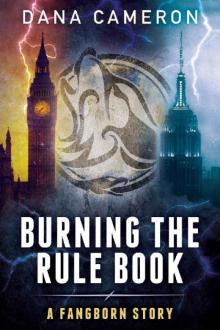 Burning the Rule Book
Burning the Rule Book Site Unseen
Site Unseen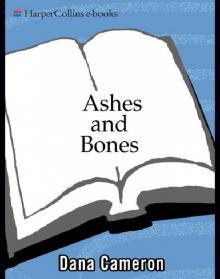 Ashes and Bones
Ashes and Bones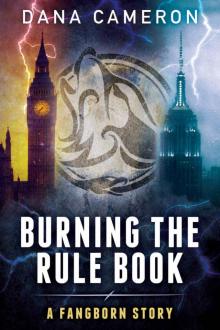 Burning the Rule Book (A Fangborn Story 3)
Burning the Rule Book (A Fangborn Story 3)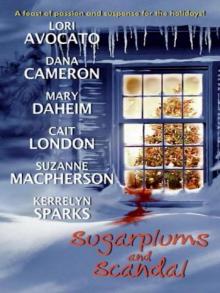 Sugarplums and Scandal
Sugarplums and Scandal The Curious Case of Miss Amelia Vernet
The Curious Case of Miss Amelia Vernet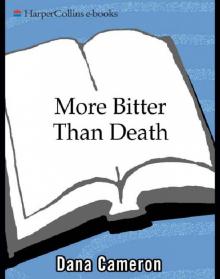 More Bitter Than Death
More Bitter Than Death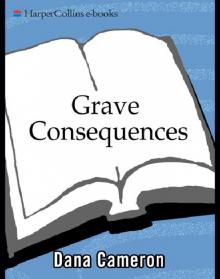 Grave Consequences
Grave Consequences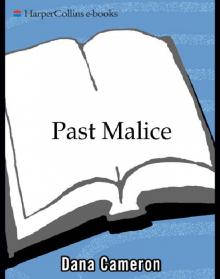 Past Malice
Past Malice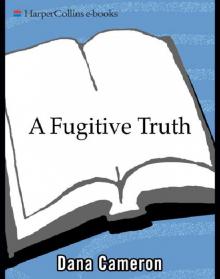 A Fugitive Truth
A Fugitive Truth Seven Kinds of Hell
Seven Kinds of Hell